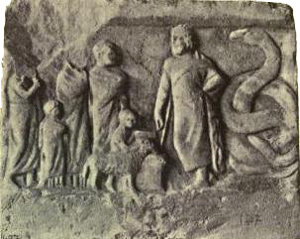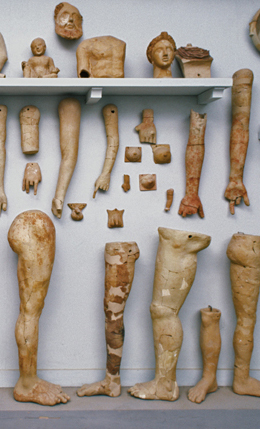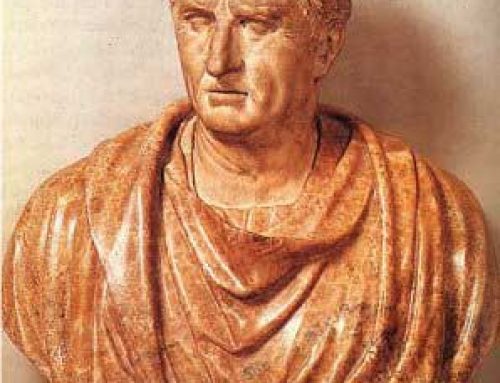
Greek medicine: Sacrificing a sheep to Asclepius
Getting sick in ancient Greece
Disease was a very serious problem for the Greeks, as for all other people in the ancient and medieval worlds. One out of three babies died before they were a year old. Half of all children died before they were ten. Even most people who grew up died in their forties and fifties.
More about life expectancy
History of diseases
Lots of Ancient Greece articles

Hints to Asclepius about which part needs fixing
Did demons make people sick?
At first, Greek doctors, like the Egyptians and Indians, believed that demons caused diseases, and that gods like the god of medicine, Apollo‘s son Asclepius, could cure diseases. Greek healers tried to cure patients using sacrifice and prayer. People often bought models of the part of their body that was sick to leave at Asclepius’ shrine. That was how they let the god know what to fix.
Egyptian doctors and medicine
Doctors in ancient India
Ancient Greek medicines
At the same time, though, Greek doctors did use medicines that worked. They used wine, opium, and henbane to help with pain and toothache, and they used aloe (originally from Egypt) to cure burns. They used crushed garlic to disinfect cuts, and mint tea to help with stomach aches.
Who invented wine?
Where did opium come from?
Scientific observation
But by around 500 BC, Greek doctors became more interested in using scientific observation and logic to figure out what caused diseases and what you could do about them. Slowly Greek doctors worked out a logical system for understanding disease.
The main collection of writings about Greek medicine is the Hippocratic Writings. They’re named after the first and most famous of these doctors, Hippocrates (hih-POH-krat-ees).
We don’t know for sure if Hippocrates really existed – his writings might be just a collection of a lot of doctors’ writings – but later Greeks thought he was a real person.

Greek medicine: a Greek doctor letting blood out of a patient because he believes in the four humors
What else was going on in 500 BC?
Diet and exercise
This logical system began with the idea that doctors should first of all be careful not to actually harm their patients. Hippocrates sensibly recommended starting treatment with good diet and exercise. That wouldn’t hurt anybody.
If the patient didn’t get better, then the doctor should try medicines. Surgery should only be used as a last resort.
Food in ancient Greece
Ancient Greek sports and games
Humors in ancient Greece
Hippocrates went on to the idea of humors, which was popular all over Europe and Asia at this time, in India and China as well as Greece.
Chinese medicine and humors
The idea of humors may even have gotten started in Greece, where it makes its earliest appearance. Greek doctors like Hippocrates believed that people were made out of four substances: blood, black bile, yellow bile, and phlegm (pronounced FLEM) (means boogers).

Greek medicine: A leech
How to balance your humors
If you were healthy, that was because your four humors were balanced. You had the right amount of each one. But if you had too much of one humor, you would be unbalanced and you would feel ill.
For instance, if you looked pale, that meant you had too little blood and you should eat liver, which has a lot of blood in it. This would totally work, because people are often pale from anemia, a shortage of iron, and liver does have a lot of iron in it.
Why do people need iron?
What does your liver do?
Bleeding patients for fever
On the other hand, Greek doctors also thought that if you had too much blood, that would give you a fever. So your medical treatment should be to reduce the amount of blood in your body. Greek doctors did this by cutting your arm until blood ran out. This was supposed to help bring down your fever. Or they put leeches on your arm to suck the extra blood out.
They did this so often that doctors were sometimes called “leeches”. And they thought it was such a good idea that doctors were still letting blood about 150 years ago, even though it just made people worse or even killed them!
Doetors in medieval Europe
Medieval Islamic doctors
Climate and medicine
Greek doctors also believed that some climates tended to increase the amount of some humors in your body. If you lived in a wet, cold climate, that would tend to increase the amount of phlegm, for instance. One treatment might be to move to a drier, warmer climate to balance out your humors again.
These ideas are mostly wrong (as the Islamic doctor Al Razi pointed out about 900 AD), but the idea that you could learn to understand and treat diseases by using careful observation and logical thought is very important to modern medicine.
Learn by doing: compare to Chinese medicine
Or compare it to Indian medicine
More about Roman medicine
Bibliography and further reading about Greek medicine:
Greek and Roman Science, by Don Nardo (1998). Nardo has written a lot of good easy to read books about the ancient world; this one is no exception.
Hippocratic Writings, by Hippocrates and others. Translated by G.E.R. Lloyd. What the Greeks themselves had to say about medical theory and practice.
Hippocrates, by Jacques Jouanna and M. B. Devevoise (1999). A commentary on the Hippocratic writings and Greek medicine in general, for adults.





This website was so helpful! Thank you!
Thanks for letting me know! I love to hear that!
What’s a humor?
Well, humors don’t really exist. But ancient doctors in Asia, Africa, and Europe thought that they did. They thought people had humors inside them, which were liquids. If you had too much or too little of these liquids, that was what made you sick. (They didn’t know about germs or viruses or cancer.) Different doctors imagined different kinds of liquids, but Greek doctors imagined four humors: blood (which is a real liquid you have inside you but it doesn’t really cause sickness), phlegm (that’s boogers), black bile, and yellow bile. Those last two are also real, but they don’t cause sickness either.
yeet
what are the arm and leg thing called?
They’re votives, or votive objects, Sarah. That means something devoted – given – to the gods.
so if someone was gay and they had a friend that was a girl but was trans would that be a gay or straight relationship
In ancient Greece, people didn’t think about being genderqueer the same way we do today, though they did do the same things that we do. Generally if a woman dressed as a man and lived as a man, people treated them as a man. If that man got a girlfriend or got married to a woman, people would have called that a straight relationship. I hope that answers your question.
There are a couple run on sentences that need fixing and then there would be no grammar mistakes. :]
I can see why you thought so, Brandon, and I have shortened some of the sentences. I hope that helps!
Overall great article and facts but have a question, How were the Artificial limbs and body parts made and how long did it take to make one?
Mostly specialists carved limbs out of wood and then painted them. Clay or stone would be too heavy and too easy to break. Sometimes people made artificial teeth out of actual teeth, either from dead people or maybe by pulling out teeth from enslaved people. Or they made them out of elephant ivory (elephant tusks) imported from Africa. Other teeth were made out of gold. I believe there were artificial toes made out of metal, too. You sometimes see clay arms and legs, but those weren’t to wear – people gave them to the gods at religious shrines to like explain to the god where it hurt, so they could be healed.
Thanks, I will tell my classmates.
This website is very good and informational but there are a couple of grammar mistakes. Overall this website is very helpful. It helped me with my project poster. I recommend this website for anyone who want’s to learn about greek medicine.
Thanks, Brandon! If anyone at your school has a page you could link to us from, that would help us out a lot, so more students could use this site.
Yes this website was very helpful in understanding what the Greek Medicine was. Definitely would recommend it for other kids and their projects, the only thing would be to fix the grammar mistakes but aside from that it’s great.
If you’re not going to give examples of grammar mistakes, it’s hard to know what you are thinking of. I’ll assume your inclusion of a run-on sentence is intentional, and ironic, here. I’m glad you liked the site though!
why didn’t you mention Aristotle and Plato
They’re not really doctors, though Aristotle’s father was a doctor. You can read more about them here: https://quatr.us/greeks/greek-philosophy-ancient-greece.htm
How long did the blood bleed out for
That’s a great question, Tyler! It depended on what was wrong with you: the Roman doctor Galen wrote a medical book that told you for each symptom how much blood to take, and also what part of the body to take it from (like, if your liver was not working, take blood from the right hand, but if your spleen was not working right, take blood from the left hand). If you were really sick, they just kept taking blood until you were fainting from blood loss. That would take about fifteen minutes, for most people.
I think that this weebsitz good!!!! Teh Grammar bad though
I’m glad you liked it! What was the grammar problem you saw?
This Website is the best!! I’m doing a report for school and it was so helpful.
Oh, I’m delighted to hear that, Alyssa! If anyone at your school has a page you could link to us from, that would help us out a lot, so more students could use this site.
This isa pretty good website but plz learn grammer
I’ll be happy to fix any specific issues you identify, Josh.
This helped me so much with S.A.T.S!
I’m so happy to hear it! Glad we could help.
You didn’t except my comments.
We only approve useful, polite comments.
no
Hi Josh, what were you trying to find out? I’d be happy to answer your questions here.
MIchigan’s a better school and better football team
Than Portland State? Yes, that’s true. But Portland State students deserve an education too.